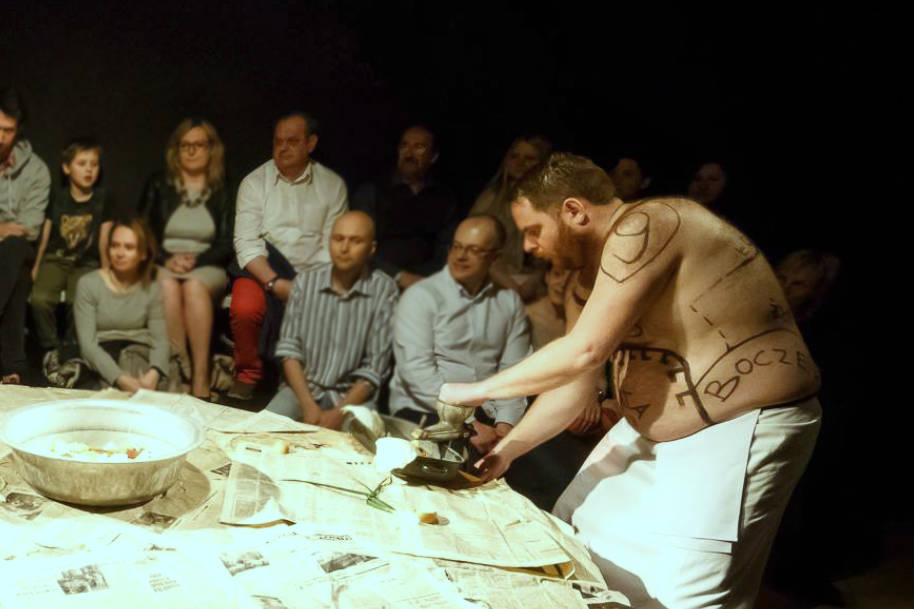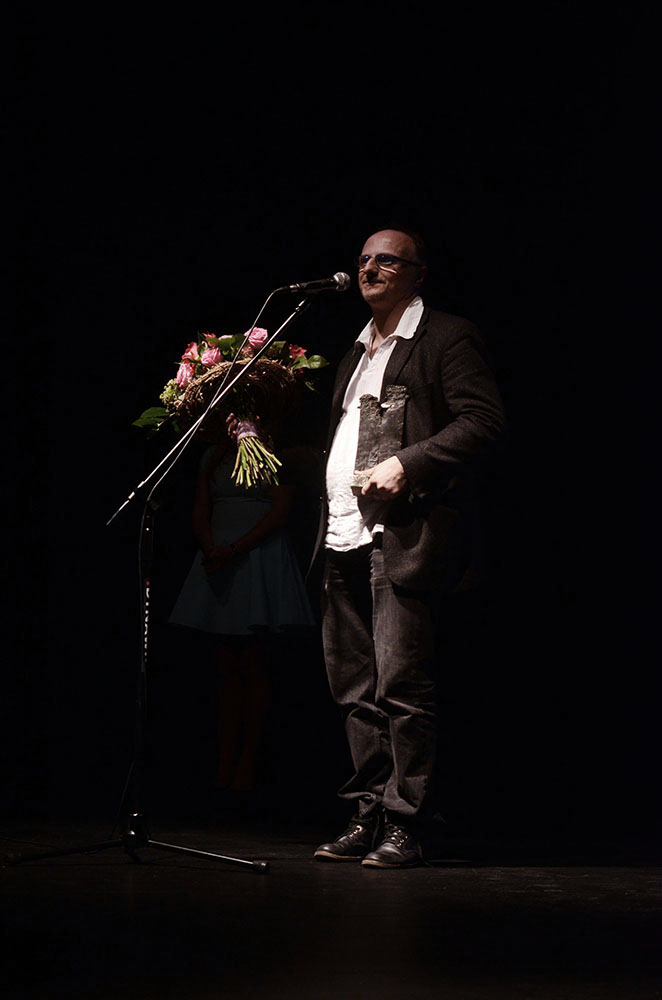Natalia Grudzień
kultura.poznan.pl
„Na początku była chuć” – pisał Stanisław Przybyszewski. „Na początku był głód” – zdają się mówić artyści z Teatru Usta Usta. Był, jest i będzie: „na wieki wieków, smacznego!”.
Centralne miejsce sceny to stół. Wielki, pokryty czerwonym obrusem. Wokół niego uwijają się dwaj pomocnicy i maestro – szef kuchni we własnej osobie. Zachłanny, makiaweliczny artysta w swoim fachu, specjalista od wątróbek, móżdżków i koreańskiej wódki z myszy. Z diabelskim błyskiem w oku zaprasza na ucztę.

Czy czegoś się Państwo napijecie na początek? Dziś w menu specjały kuchni ludzkiej: móżdżki, dusze i emocje. Wszystko na sprzedaż i wszystko do zjedzenia. Przygotowane z najlepszych produktów. W karcie do wyboru same dania główne. Jedne pożerają się wzajemnie, inne mniej lub bardziej dobrowolnie oddają się na pożarcie. Stół to scena, scena to stół. Przy stole się je, pije, załatwia interesy, kłóci. Jest również więzieniem, lochem bez dostępu światła. Metaforycznie icałkiem dosłownie. Bierzcie i żryjcie z niego wszyscy.
Problem ma ten, kto nie ma apetytu.
W wyścigu po najlepszy kąsek najprawdopodobniej nawet nie wystartował. Patrzy tylko bezwiednie w dal, nie reagując na mamusine „zjedz, bo będziesz głodny”. W tym świecie reguły są proste: odczuwać głód to znaczy żyć.
„Uczta” Teatru Usta Usta to nie swobodna wymiana myśli, jak podczas uczty platońskiej z ewentualnym dyskretnym użyciem piórka. To raczej „Wielkie żarcie” Ferreriego. W filmie czterej mężczyźni spotykają się na uczcie, by razem popełnić samobójstwo z przejedzenia. Skutecznie. To był 1973 rok – obraz dosadnie prezentował w soczewce społeczeństwo, którego motorem jest niepohamowana konsumpcja i hedonizm. Witamy w roku 2013! Świat z „Uczty” Ust to świat napędzany przez fizjologiczny głód ciała i umysłu, potrzebę posiadania, której nie można zaspokoić. To wielkie, niepohamowane, zachłanne pożeranie. Mniejszego przez większego, słabszego przez silniejszego. Ale nie tylko z żądzy pieniądza. To również głód emocji, głód przydatności, posiadania celu. Niszczący i nie dający się opanować. To nie chuć napędza świat, to głód. Przykazanie jedenaste powinno brzmieć: nie będziesz ulegał swojemu głodowi.
I niech się Państwu nie wydaje, że po tej uczcie wytrzecie chusteczką kącik ust, zapłacicie rachunek i pospiesznie oddalicie się do swoich domów. O nie!
Ciasna przestrzeń Sceny Roboczej sprawia, że my, widzowie siedzimy jak w ciemnej i dusznej piwniczce. Przy centralnym stole, a jednak w cieniu. Uczestniczymy w tej makabrycznej uczcie z drugiego rzędu. Jednak w tej orgii zjadania każdego przez każdego też się nie uchowamy. Nic z tych rzeczy. Sprawne oko szefa kuchni wychwyci naszą przydatność do spożycia. A pomocnicy już ostrzą noże.
For ever and ever, enjoy your meal!
Stanisław Przybyszewski pronounced that “In the beginning, there was lust”. The artists from Theatre Usta Usta seem to say “In the beginning, there was hunger”. It was, is and will be “forever and ever, enjoy your meal!” A table occupies the centre of the stage. A very large table, covered with red tablecloth. Bustling around it are two kitchen hands and the maestro – the chef himself. A greedy, Machiavellian artist of his profession, expert in livers, brains and Korean mouse vodka. With a devilish glint in his eye, he invites everyone to the feast. Would you like a drink to start? In today’s menu, we offer delicacies of the human cuisine: brains, souls and feelings. All available and all to be eaten. Made from the best products. There are only main dishes on the menu. Some devour one another, others let themselves be eaten, more or less voluntarily. The table is the stage, the stage is the table. This is where you eat, drink, do business, or fight. It is also a prison, a dungeon with no access to light. Both metaphorically and quite literally. Take it and gobble on it all.The one who is not hungry has a problem there. They probably have not even started in the race for the most delicious morsel. They only gaze cluelessly into the distance, ignoring mummy’s “eat, or you’ll go hungry”. In this world, the rules are simple: to feel hunger means to live. The Feast by Theatre Usta Usta is not a free exchange of thought, as during a Platonic feast, with a potential, discreet use of the feather. This is more akin to Ferreri’s The Great Feed. In the film, four men meet at a feast to commit suicide by eating themselves to death. Successfully. That was 1973 – the picture was a vivid epitome of the society driven by unbridled consumption and hedonism. Welcome to 2013! The world in Usta’s The Feast is a world propelled by a physiological hunger of body and mind, by a need to possess which cannot be satisfied. It is a colossal, uncontrollable, voracious feeding frenzy, where the smaller is eaten by the bigger, the weaker by the stronger. Not only because of the lust for money. There is also greed of emotion, hunger of being useful, of having a purpose. Destructive and impossible to tame. This is not lust that gives the world momentum, but hunger. The eleventh commandment should be: thou shalt not yield to thy hunger. Make no mistake: after the feast you will not wipe the corner of your mouth with the napkin, pay the bill and hurriedly go home. No way! The cramped space of Scena Robocza makes the audience sit as if in a gloomy and stuffy cellar. At the main table, yet in the shadows. We partake in this macabre feast from the second row. Nonetheless, in this orgy where everyone eats everyone we shall not be spared. Nothing of the kind. The skilled eye of the chef will ascertain whether we are fit for consumption. And his hands are sharpening the knives already.

Słodko-gorzka „Uczta”
Kamil Babacz
Głos Wielkopolski
„Uczta” jest smaczna, choć może pozostawić po sobie zgagę… moralną.

Człowiek to tylko sterta mięsa
Małgorzata Strzyżewska
kulturalnytorun.pl
Uczta została genialnie przygotowana. Od samego początku…

„Uczta” wygrała Klamrę
Małgorzata Strzyżewska
kulturalnytorun.pl
Nasz spektakl ma smak, ale bardzo gorzki. Przeprowadzamy widza, przez bardzo trudne, ciężkostrawne przemyślenia
